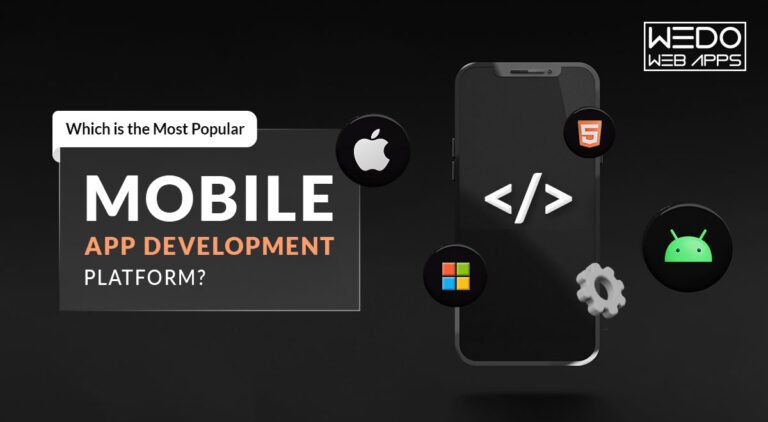2 Feb, 2023 | Mobile App Development
Which is The Most Popular Mobile App Development Platform?

Android
Android is one of the most popular mobile app development platforms, and one of the advantages of using this platform is that developers can leverage existing open-source libraries and frameworks to create an app. This platform also offers a strong community support system, making it easier for developers to find help if they get stuck. Additionally, Android apps have a broader reach compared to other platforms due to its prevalence across budget devices, both phones and tablets.iOS
iOS is another popular mobile app development platform. This platform often has higher user engagement and better monetization of apps due to its loyal, more affluent user base. Additionally, it offers developers access to powerful hardware features like Siri, Face ID, and ARKit. Furthermore, Apple’s strict quality guidelines often result in fewer bugs in apps than other platforms. All of this results in a better overall user experience and makes iOS an attractive platform for developers.Windows
Windows is also a popular mobile app development platform with its own set of advantages. Windows apps can be written in various programming languages, making it an attractive option for developers with different levels of technical knowledge and skill. Furthermore, its tools offer many features such as UI testing, advanced debugging options and the ability to target almost any device from desktop computers to mobile devices. This makes Windows a great choice for apps that demand advanced functionality and greater versatility.HTML5 Mobile Web App Development
One of the most popular mobile app development platforms is HTML5. This platform enables developers to create cross-platform apps for mobile devices that are compatible with any browser, such as Safari and Chrome. HTML5 is also well-regarded for its ability to provide features such as offline storage capabilities, extensive media support, geolocation support and an application programming interface (API) for widgets as well as full integration with existing websites. As a result, many businesses have adopted this platform to quickly create mobile applications without having to learn new languages or technology.
Cross-Platform App Development
For businesses looking for a quick development solution, there are three major cross-platform app development platforms to consider. JavaScript-based frameworks such as PhoneGap and Ionic allow developers to create hybrid mobile apps that can be deployed on both iOS and Android. Alternatively, React Native allows users to write native mobile apps using a language shared between web and mobile development, while Flutter is a great option for those who want to build beautiful yet powerful apps within a short time frame.Frequently Asked Questions
In the United Kingdom, the most popular mobile app platform is Apple's iOS, followed closely by Google's Android platform. According to recent statistics, iOS holds a 47.1% share of the mobile operating system market, while Android holds a 51.3% share. However, it's worth noting that the popularity of each platform may vary depending on factors such as age group, region, and industry.
Both iOS and Android platforms have a significant market share for app development, but currently, Android has a slightly larger market share in the United Kingdom. As of 2021, Android holds about 53.4% of the smartphone market share, while iOS holds about 46.3%. However, it is crucial to note that the popularity of each platform can vary depending on the type of app being developed and the target audience. Developers should consider various factors such as user preferences, app features, and marketplace trends before deciding which platform to focus on.
Businesses will want to consider a variety of factors when choosing a platform for app development. One important factor is the target audience for the app. Different platforms may appeal to different demographics, such as iOS devices being more popular among wealthier users. Another consideration is the development tools and languages required for each platform, as well as the costs associated with developing and maintaining the app for each platform. Businesses may also want to consider the app store policies and approval processes for each platform. With all of these factors in mind, businesses can make an informed decision on which platform will best suit their needs and target audience.
Recent studies report that the usage of mobile apps continues to increase in the UK with 81% of smartphone users accessing at least one app per day. The most popular app categories are social media, messaging, entertainment, and gaming. Additionally, there is a growing trend in the use of health and fitness apps as well as mobile banking and finance apps. With the rise of remote working, there has been an increase in productivity and collaboration apps like Zoom, Microsoft Teams, and Slack. Furthermore, there has been a surge in demand for sustainable and ethical-focused apps that help users make eco-friendly choices. Overall, the trend in the UK seems to be shifting towards apps that provide convenience, efficiency, and sustainability.
In mobile app development, there are several emerging trends and technologies on each platform. On the iOS platform, one such trend is the integration of artificial intelligence (AI) and machine learning (ML) into mobile apps. This enables apps to better understand users and deliver personalized experiences. Additionally, Apple's ARKit framework is opening up new possibilities for augmented reality (AR) apps. On the Android platform, there is a growing trend towards instant apps, which allow users to access app content without downloading the entire app. This can lead to better user engagement and retention. Additionally, Google is investing heavily in the Flutter framework, which enables developers to build high-performance, cross-platform apps with a single codebase.

